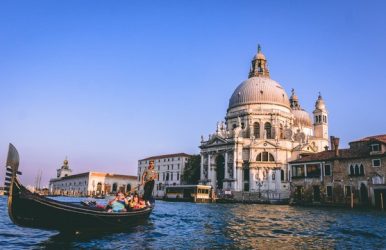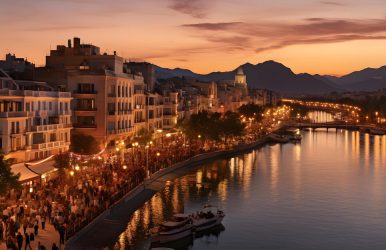Best Hotels In Paris: Understanding How They Are Supporting The City’s Tourism Today
BY Sibashree Apr 28, 2025
This time, I was on a 2-day Paris travel and was working on how the best hotels in Paris have been supporting the thriving tourism scene in the city. I did my case study on the hotels near Opera Paris France, to get the entire picture. I also had the opportunity to meet the leaders of Citadines Apart'hotel Opéra Paris, which The Ascott Limited operates. They shared their insights and observations with me. Paris had a footfall of 11.2 million during the Summer Olympics of 2024. The success story with great numbers continued as Paris consolidated the Olympics’ success for the rest of the year. This boost in the number of tourists has further facilitated growth in the hospitality sector. The French hospitality sector is expected to grow at a CAGR of 2.34% from 2023 to 2028. However, these two booming industries are also bearing the wrath of overtourism in the city. So, there could not be a better time to delve deeper into how the best hotels in Paris have been supporting tourism so far. Also, we need to talk about how they respond to minimize the impact of overtourism with sustainable practices. Best Hotels In Paris: Working And Growing With The Tourism Industry Of The City The best hotels in Paris are beyond tourist accommodations. With luxury in mind and an upscale shift, these hotels are influencing the spending patterns of tourists. France was the most-visited country in the world in 2024, with an unbelievable footfall of around 100 million. Now, a large number of these tourists look for accommodations in luxury hotels. With their hotel expenses and overall luxury spending increasing, the city gains revenue. This approach aligns with what Nathalie Delattre, the French Minister of Tourism, stated in response to the anticipated tourism boom in France for 2024. “We need to work to increase the average each visitor spends and get our visitors to stay longer.” The impact of hotels in Paris on tourist spending patterns extends beyond the standalone tourism and hospitality industry. It’s about the overall GDP and economy of the city. But the “luxury experience” here is not to scare you if you are a tourist. It does not mean that you cannot visit Paris within a budget. It’s true that Paris, as a travel destination, is somewhat expensive, and accommodations are pricier than those in similar setups in other countries. However, the city offers a diverse range of hotel tariffs. A Shared Market Space Creating Discord Between The Hotel And Tourism Sectors? A shared market space! This has been one of the biggest challenges for the top hotels in Paris, as they collaborate with the tourism industry to boost the city’s economy. Now, services like AirBnb are offering more flexibility in booking and better pricing options. So, of course, there is the “price sensitivity” factor. Additionally, Airbnb is eager to seize opportunities, as it did during the Summer Olympics in Paris last time. Airbnb was the official sponsor of the Paris Olympics, and it played a significant role in the 44% surge in short-term rental bookings in 2024 from the summer of 2023. Also, Airbnb was direct when it approached the visitors of the Paris Olympics to avoid the “touristy side of Paris" and book short-term rentals on the “Paris-y side of Paris.” Moreover, Airbnb, through the “Airbnb500 Travel Grant,” offered discounts to tourists visiting Paris during the 2024 Summer Olympics. Now, with discounted pricing and Parisians willing to give up their accommodation on rent through Airbnb, many hotels in Paris have suffered. "The rate discounting that's happened, the occupancy levels, they're definitely being suppressed and compressed by the short-term rental market, without question.”Blake Reiter, Director of Research, Lighthouse Having said that, the best hotels in Paris have been able to keep their presence strong as they cater to the group of tourists seeking a high-end experience. Additionally, city officials have introduced restrictions on short-term rentals to prevent Airbnb and similar businesses from causing significant harm to the hospitality industry. Moreover, in November 2024, France approved an “Anti-Airbnb Bill” to control the increase in vacation rentals. So, the threats of a shared market space have become less for the best hotels in Paris and other parts of France. Overtourism In Paris: How The Best Hotels In Paris Respond To It? The best hotels in Paris had a slow start in summer 2024. However, with the Summer Olympics inching closer, occupancy rates in these hotels increased despite challenges from Airbnb and other short-term rental services. During the summer Olympics, the hotel occupancy rate in this area reached 84%. Of course, there was revenue growth with a higher occupancy rate, discounts, and non-refundable rooms for tourists. Still, the housing industry could not avoid an accommodation crunch, hygiene issues, safety threats, and other impacts of overtourism. A sustainable collaboration between the best hotels in Paris and tourists is crucial. It will minimize the environmental impact and enhance the overall quality of life in the city. For example, The Ascott Limited's sustainability program has helped me understand how the best hotels in Paris are doing it right. They are trying to minimize the impact of overtourism on the city’s environment and natural resources. Showing Commitment To Sustainability The Ascott Limited is sincere about taking care of the environment. Also, it has earned the Global Sustainable Tourism Council (GSTC) Committed status. Moreover, Ascott Limited aims to achieve GSTC-Accredited Body certification for its global portfolio by 2028. The sustainability program, known as “Ascott CARES,” is based on five fundamental pillars, and those are: Respect Alliance Community Environment Supply Chain Also, Ms. Beh Siew Kim from Ascott has mentioned that sustainability has always been a key priority for the business. “The Ascott Limited aiming to have all their properties certified by GSTC-accredited Certification Bodies by 2028 where applicable* is a testament to how serious they are committed as an organization to environmental and social responsibility. We applaud Ascott’s leadership and vision in prioritizing sustainability, and I am confident that their efforts will set a benchmark for others in the sector to follow.”Randy Durband, CEO, The Global Sustainable Tourism Council With Ascott Limited as an example, the best hotels in Paris are also redefining the tourism landscape. They are also trying to fight overtourism by building a sustainable future.











